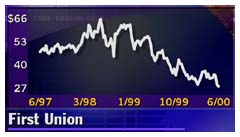|
Money Store closes doors
|
 |
June 26, 2000: 2:01 p.m. ET
First Union takes $2.8B charge for unit, other items; lowers 2Q profit target
|
NEW YORK (CNNfn) - The Money Store proved to be a money pit for First Union Corp., which said Monday it will take a $2.8 billion charge and close its home equity lending operation, a few days before the second anniversary of its purchase of the chain.
The Charlotte, N.C., bank holding company also warned investors that due partly to problems at the Money Store, earnings in the second quarter will miss expectations, even before charges plunge the company into the red.
 First Union announced a series of other restructuring steps, including agreeing to the sale of its mortgage servicing business to Wells Fargo & Co. (WFC: Research, Estimates) for an undisclosed amount. It is also in the process of selling its credit card portfolios, as well as 84 bank branches in markets where it does not have a leading market share. First Union announced a series of other restructuring steps, including agreeing to the sale of its mortgage servicing business to Wells Fargo & Co. (WFC: Research, Estimates) for an undisclosed amount. It is also in the process of selling its credit card portfolios, as well as 84 bank branches in markets where it does not have a leading market share.
But most of the charge, about $1.8 billion, comes from a write-off of goodwill and other intangibles associated with its Money Store purchase of that closed June 30, 1998.
The company said earnings in the current quarter will be 72-to-74 cents a share before charges of $3.00-to-$3.10 a share. The forecast of analysts surveyed by earnings tracker First Call was for a profit of 85 cents a share, up from 82 cents a year earlier.
Ken Thompson, president and chief executive of First Union (FTU: Research, Estimates), told analysts that he and the board had considered all options, including a possible sale of the company, before announcing Monday's moves, but that they were confident that it now had the proper focus going forward.
"I'm not looking at this company through rose-colored glasses," he said. "I know we have a tremendous amount of work to do to regain your confidence and I don't have a silver bullet to make that happen."
Promises no major acquisitions on horizon
It was the first analyst meeting as CEO for Thompson, who assumed the post earlier this year when Edward Crutchfield left due to cancer.
Crutchfield's aggressive acquisition strategy built First Union from a regional bank to one of the leading banking franchises on the Eastern seaboard. But some of the purchases have proved difficult to digest, and analysts and investors punished its share price for the dilution of earnings that accompanied some deals. Thompson made clear the bank was renouncing that acquisition strategy going forward.
"We'll be far tougher on acquisition economics in the future," he promised, saying there would be no major deals in the foreseeable future. "Growth in the future will not be fueled with dilutive acquisitions."
Money Store deal never worked
The Money Store purchase will probably stand as the company's worst deal. The chain had 172 branches in all 50 states two years ago when First Union purchased it for $2.1 billion, and that had been cut to 38 branches in 29 states as of Monday, when those offices were closed.
Thompson said First Union's analysis could not see it generating a profit for at least three years.
The Money Store's focus was loans to consumers whose credit history had blemishes that made bank loans difficult to obtain, a sector-known as sub-prime lending. It was also the leading lender under the Small Business Administration guaranteed loan program, but while those loans kept the Money Store name, that operation was transferred to a unit of First Union last year. It will continue to operate under the name First Union Small Business Capital.
First Union also will continue to collect and service existing Money Store consumer loans. About 2,350 of the chain's 3,650 employees will lose their jobs under the move.
First Union said it decided to focus more clearly on its core businesses -- asset management, brokerage, wealth management, small business banking, e-commerce and high-growth areas within capital markets.
"These actions will free up approximately $1 billion of capital for reinvestment in core businesses and share repurchases," the company said. Its set an earnings-per-share growth target of 10 to 12 percent annually after 2001.
Merrill Lynch analysts downgraded First Union's stocks to "near-term accumulate" from a "near-term buy" rating after Monday's announcement.
"Thompson's bold makeover plan is a long-term plus, and the correct decision," Merrill Lynch's analysts said in report. "However, it will lead to a sharply lower, but better quality, starting earnings-per-share base than expected."
But market reaction to the announcements was generally positive, despite the earnings warning. Shares of First Union edged up 1/16 to 27-7/8 at midday, rebounding from a loss in pre-market trading. 
|
|
|
|
|
 |

|

